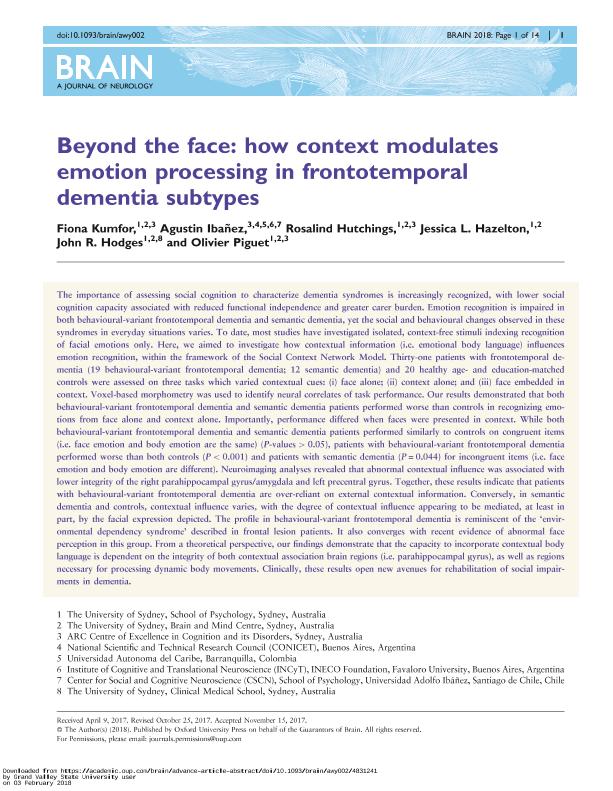Artículo
Beyond the face: How context modulates emotion processing in frontotemporal dementia subtypes
Kumfor, Fiona; Ibañez, Agustin Mariano ; Hutchings, Rosalind; Hazelton, Jessica L.; Hodges, John R.; Piguet, Olivier
; Hutchings, Rosalind; Hazelton, Jessica L.; Hodges, John R.; Piguet, Olivier
 ; Hutchings, Rosalind; Hazelton, Jessica L.; Hodges, John R.; Piguet, Olivier
; Hutchings, Rosalind; Hazelton, Jessica L.; Hodges, John R.; Piguet, Olivier
Fecha de publicación:
04/2018
Editorial:
Oxford University Press
Revista:
Brain
ISSN:
0006-8950
Idioma:
Inglés
Tipo de recurso:
Artículo publicado
Clasificación temática:
Resumen
The importance of assessing social cognition to characterize dementia syndromes is increasingly recognized, with lower social cognition capacity associated with reduced functional independence and greater carer burden. Emotion recognition is impaired in both behavioural-variant frontotemporal dementia and semantic dementia, yet the social and behavioural changes observed in these syndromes in everyday situations varies. To date, most studies have investigated isolated, context-free stimuli indexing recognition of facial emotions only. Here, we aimed to investigate how contextual information (i.e. emotional body language) influences emotion recognition, within the framework of the Social Context Network Model. Thirty-one patients with frontotemporal dementia (19 behavioural-variant frontotemporal dementia; 12 semantic dementia) and 20 healthy age- and education-matched controls were assessed on three tasks which varied contextual cues: (i) face alone; (ii) context alone; and (iii) face embedded in context. Voxel-based morphometry was used to identify neural correlates of task performance. Our results demonstrated that both behavioural-variant frontotemporal dementia and semantic dementia patients performed worse than controls in recognizing emotions from face alone and context alone. Importantly, performance differed when faces were presented in context. While both behavioural-variant frontotemporal dementia and semantic dementia patients performed similarly to controls on congruent items (i.e. face emotion and body emotion are the same) (P-values 4 0.05), patients with behavioural-variant frontotemporal dementia performed worse than both controls (P 5 0.001) and patients with semantic dementia (P = 0.044) for incongruent items (i.e. face emotion and body emotion are different). Neuroimaging analyses revealed that abnormal contextual influence was associated with lower integrity of the right parahippocampal gyrus/amygdala and left precentral gyrus. Together, these results indicate that patients with behavioural-variant frontotemporal dementia are over-reliant on external contextual information. Conversely, in semantic dementia and controls, contextual influence varies, with the degree of contextual influence appearing to be mediated, at least in part, by the facial expression depicted. The profile in behavioural-variant frontotemporal dementia is reminiscent of the ‘environmental dependency syndrome’ described in frontal lesion patients. It also converges with recent evidence of abnormal face perception in this group. From a theoretical perspective, our findings demonstrate that the capacity to incorporate contextual body language is dependent on the integrity of both contextual association brain regions (i.e. parahippocampal gyrus), as well as regions necessary for processing dynamic body movements. Clinically, these results open new avenues for rehabilitation of social impairments in dementia.
Palabras clave:
BEHAVIOUR
,
EMOTION
,
FRONTOTEMPORAL DEMENTIA
,
PRIMARY PROGRESSIVE APHASIA
Archivos asociados
Licencia
Identificadores
Colecciones
Articulos(INCYT)
Articulos de INSTITUTO DE NEUROCIENCIAS COGNITIVAS Y TRASLACIONAL
Articulos de INSTITUTO DE NEUROCIENCIAS COGNITIVAS Y TRASLACIONAL
Citación
Kumfor, Fiona; Ibáñez Barassi, Agustín Mariano; Hutchings, Rosalind; Hazelton, Jessica L.; Hodges, John R.; et al.; Beyond the face: How context modulates emotion processing in frontotemporal dementia subtypes; Oxford University Press; Brain; 141; 4; 4-2018; 1172-1185
Compartir
Altmétricas



